 |
|
HOME | PROCLAMATION! MAGAZINE | DEVOTIONALS | STUDIES | LETTERS | ABOUT US | RELATED WEBSITES |
|
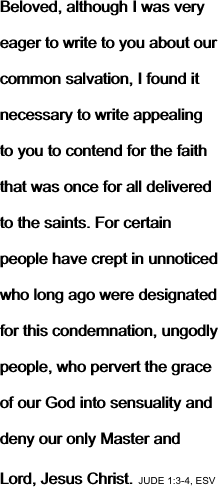 |
|
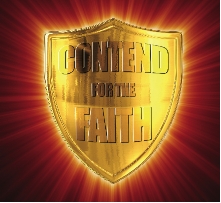 |
|
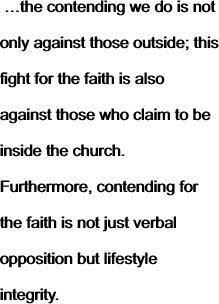 |
|
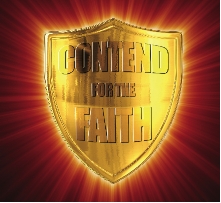 |
|
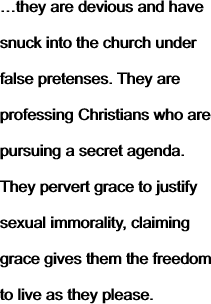 |
|
 |
|
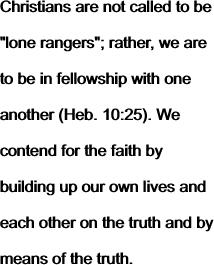 |
|
 |
|
Gary Inrig joined the staff of Trinity Church as senior pastor in September of 1992 after many years of fruitful ministry in Calgary and Dallas. He holds D.Min. and Th.M. degrees from Dallas Theological Seminary. He has authored nine books and has taught in various capacities in many seminaries and Bible colleges. He and his wife Elizabeth have three children and eight grandchildren. |
|
October November December 2010
VOLUME 11, ISSUE 4
A R T I C L E S

GARY INRIG
Based on a three-part sermon series on the book of Jude,
presented at Trinity Church in Redlands, California
Thornton Wilder put these words in the mouth of one of his characters: "Living is struggle. I know that every good and excellent thing in the world stands moment by moment on the razor-edge of danger and must be fought for." (The Skin of Our Teeth, 1942).
Wilder is right. If we take things for granted, we will eventually lose them. Among all the things for which we fight, however, nothing is more under attack than the gospel.
The book of Jude, one of the smallest books in the New Testament, carries a big warning that the truth of the gospel stands on the razor's edge of danger. Jude summons us to fight for the gospel with both our lives and our words.
Jude reorients his identity around the risen Christ
The core of this book is the challenge in verse 3 to "contend for the faith". Jude introduces this challenge, however, in verses 1 and 2 where he explains the nature of this faith and reveals his own identity.
The author identifies himself as "Jude". The New Testament records at least eight people with this name or one of its variants, but Jude prevents our speculation by saying he is "the brother of James." Only one "James" was so prominent in the early church that he needed no other identification: James, the brother of Jesus (Gal. 1:19). Thus we know that Jude was the younger half-brother of the Lord Jesus listed in Mark 6:3 and Matthew 13:55, but he doesn't describe himself as the "brother of Jesus". Instead, he says he is the "slave of Jesus Christ."
Calling himself Jesus' "slave" is much stronger than saying he's Jesus' "servant". "Slave" says Jesus owns him—a remarkable statement of Jesus' identity from a man who could claim kinship but instead sees himself as His slave. At the same time, a slave's importance was directly tied to the status of his master. Thus, as Jesus' slave, Jude was giving us a claim of authority.
Jude had not always believed in Jesus. John 7:5 says he and the rest of Jesus' brothers did not believe in Him during His ministry, yet after the resurrection Jude had bowed in faith and trust at the foot of his half-brother, and now he demonstrates that he lives completely at His disposal. Jude gives us a wonderful insight into how we are to view the Lord Jesus and, as a result, how we are to view ourselves. Jude's understanding of who Jesus is completely changed his view of himself.
Jude calls us to understand our need to contend for the gospel
Jude does not tell us who the recipients of his letter were or where they lived, but his tone is urgent. The church is in a far more precarious situation than it recognizes, and he is concerned that Christians are "asleep at the wheel" while the truth is being stolen from them. This situation has happened repeatedly through the centuries. We can look today at institutions and denominations which once stood clearly for the gospel, but now they stand against it.
Jude's conviction reveals that his readers must not only believe and value the gospel; they must contend for it. Before they contend for the faith, however, Jude wants them to remember the wonder of their common salvation. Verses one and two say: "To those who are the called, beloved in God the Father, and kept for Jesus Christ: May mercy and peace and love be multiplied to you."
Christ-followers understand God's provisions in the gospel
As Christ-followers, we are called by God to salvation. The term "called" is one of the most frequent one-word descriptions of a Christian in the New Testament, and it explains why we are Christians. Further, the New Testament speaks of God's call in two ways; there is a general call of the gospel for people to come to Christ, and there is a special and powerful call of God by the Holy Spirit that summons people to new life.
For Christians, the call of God is the inward, effectual, irresistible call of God the Holy Spirit that awakens faith in us and brings us to Christ. He convicts us of sin, takes away the veil that blinds us to Christ, and stirs up faith in our hearts (Rom. 8:28-30; 2 Tim. 1:9).
Moreover, when we are accepted in Christ, we are adopted into the Father's family and experience the new, constant privilege of being those He loves. This love is not the general love of God that He has for the world, but the special, mysterious, grace-based love of God that he has for those who belong to His Son (1 Jn. 3:1; Deut. 7:7-8; 10:14-15; Jer. 31:3; Rom. 5:6-8; 8:38-39).
Finally, verse three tells us that not only are we called and loved by God the Father, but we are kept by God for the Lord Jesus. The Greek expression translated "kept" in verse one is a perfect tense, indicating that this is an ongoing status. This reality of God's keeping us is the fulfillment of the Lord's prayer for His people and of God's promise. In His prayer Jesus said,
"I am no longer in the world, but they are in the world, and I am coming to you. Holy Father, keep them in your name, which you have given me, that they may be one, even as we are one. While I was with them, I kept them in your name, which you have given me. I have guarded them, and not one of them has been lost except the son of destruction, that the Scripture might be fulfilled…I do not ask that you take them out of the world, but that you keep them from the evil one (Jn. 17:11-15).
In this passage the word "kept" describes the action of a security detail which is guarding and protecting those the Father has given Him. Jesus asks His Father to guard His disciples for Him in His absence, and this protection keeps them safely in relationship with Him.
Jude emphasized this point in verse 24: "Now to him who is able to keep you from stumbling and to present you blameless before the presence of his glory with great joy."
We are kept by God for Jesus Christ, and one day we will be presented to the Lord Jesus as His bride with great joy. Hear the word of God saying to you, "You are called, loved, and kept." We may be under attack, but we are also under protection—called, loved, and kept by God Himself. This is the promise of the gospel.
Jude follows this declaration of our status in Christ with this blessing in verse 2: "May mercy and peace and love be multiplied to you." As His beloved called ones, kept for Jesus Christ and empowered by the Holy Spirit, we have a responsibility to contend for our great entrustment: the faith delivered to us once for all.
Embrace responsibility
"The faith once for all delivered to the saints" (v. 3) is a fixed and final faith, a revealed body of truth from God. The apostles did not alter it, and it must not be altered by human traditions or diminished by unbelief and cultural accommodation. Similarly, it must not be subverted by immoral living. It cannot be adjusted so it becomes culturally more relevant to us.
It will not be added to. There are no new revelations of "present truth" or golden plates or "heavenly visions" bringing new light. The gospel is not a steadily accumulating, evolving human achievement. Rather, it is given by God Himself, and it is complete.
Finally, this faith is a divine entrustment. It doesn't belong to an elite few but is the property and responsibility of all of God's people. We each must guard the gospel.
The word "contend" is a term that comes primarily from the Greek games and primarily connotes the kind of intense energy expended in wrestling.
Paul uses a similar word in Philippians 1:27 where he says to strive "together for the faith of the gospel," and again in 1 Timothy 6:12 where he admonishes his protege to "fight the good fight of faith."
In other words, we are not just to resist an attack on our faith but to fight for it. This command does not allow us to paper over all differences and accept everyone's opinion as equally valid.
At the same time, the contending we do is not only against those outside; this fight for the faith is also against those who claim to be inside the church. Furthermore, contending for the faith is not just verbal opposition but lifestyle integrity.
Jude is saying that if you've understood the gospel, you are to contend for this entrustment. Don't let the church you attend get off base. Don't let culture and lifestyle dilute the faith.
You are called by God, loved by the Father, and kept for Jesus Christ. When those things seep into your soul, you know the One whose gospel you must defend.
Spiritual emergency
In verse 4 Jude moves from a call to contend for the faith into exposing a spiritual emergency: the once-for-all faith is being attacked. The faith for which we must contend is an irreducible core of truth that centers on the person and work of the Lord Jesus. The Christian gospel is not a do-it-yourself "salad bar" spirituality where we choose what we like and discard what we dislike. Rather, believers are called to contend constantly for this faith with both their words and their lives as a matter of loyalty to Christ.
Contending for the faith is challenging in a culture that exalts relativism, pluralism, diversity, and tolerance but rejects the concept of "fixed truth". Even some Christians will say, "What you do is what matters, not what you believe." Jude would directly oppose that notion: "this is the faith once for all delivered to the saints!" What you believe directly affects what you do.
Christians may cry, "Deeds over doctrine! Doctrine divides!" But this idea is not biblical.
Contending, however, does not mean "contentious". It may not be wrong to be angry about the presence of false teachers, but it is always wrong to be unloving and unrighteous in our zeal for the truth. Nevertheless, we must contend, but in a way that honors the Lord Jesus whom we represent.
Verse 4 explains why we contend: "godless" persons have crept into the church unnoticed. This word means they have no reverence for God. They are religious; they use religious words and speak of God, yet they are not inflamed with passion for His glory.
Additionally, they are devious and have snuck into the church under false pretenses. They are professing Christians who are pursuing a secret agenda. They pervert grace to justify sexual immorality, claiming grace gives them the freedom to live as they please. For the specific false teachers Jude describes, self-indulgent sexuality is a major part of their agenda (note verses 7, 16, 18).
These false teachers also deny the Lord Jesus. Almost never is there a denial of Christian behavior without a corresponding denial of Christian theology. In the context of Jude, however, the false teachers' denial was primarily behavioral. Similarly, in the evangelical community today, people are not overtly speaking incorrect theology, but they are justifying sinful lifestyles and thereby denying their Lord.
While heresies come in many different forms, false teaching is false teaching. Jude's emphasis is strongly on the inevitable judgment of the false teachers at the hands of God.
A case study
Jude's audience knew both the Old Testament and the traditions that had developed related to many of the episodes. In verses 5-16 he refers to eight different events in "shorthand", expecting his readers to understand his references. First, the references to biblical episodes occur in verses 5–7, 9, 11, 14–15, and 17–18. Then Jude compares the false teachers to the people and creatures in the biblical stories who opposed the will of God. These comparisons are noted by the words "these people", and they occur in verses 8, 10, 12, 16, and 19. Jude uses these comparisons to describe the spiritual danger facing his readers.
Cycle one: false teachers reject God-given moral boundaries (verses 5–8)
Cycle one alludes to three different Old Testament stories. First, the Exodus generation, set free by God through miraculous events, refused to trust God to lead them into Canaan. Why? Ten out of twelve leaders sent to spy out the land reported that conquest was unthinkable because the inhabitants were so big. God judged this generation for their unbelief. Ten unbelieving leaders led an entire nation into unbelief and divine judgment, and that entire generation, with the exception of Caleb and Joshua, the two faithful spies, died in the wilderness.
Verse 6 refers to the story in Genesis 6 where apostate angels rebelled against God's order, engaged in immorality with women, and have come under judgment. God has kept those angels in "eternal bonds under darkness for the judgment of the great day."
Verse 7 refers to Sodom and Gomorrah, when the townspeople clamored for Lot to send his visitors out to them so they could engage in unlawful homosexual acts. Those people came under God's judgment and serve as an example of those who will undergo the punishment of eternal fire.
The false teachers are exposed in verse 8 as claiming to receive revelatory dreams. They claim to be spiritual authorities with present truth for the church, but they are indulging in immorality and are rejecting any authority above themselves, whether of the Lord or of angels. They are guilty of the same arrogance and immoral behavior as the ancient Israelites, as the apostate angels of Genesis 6, and as the inhabitants of Sodom and Gomorrah.
Cycle two: false teachers disrespect divine authority (verses 9–10)
This illustration is the story of the Archangel Michael and Satan disputing over the body of Moses. The story of Moses' death is recorded in Deuteronomy 34, but nothing is said about a dispute over his body. The Jews were fascinated with the story of Moses' death, and many traditions about it grew up in Jewish writings. Jude clearly believed one of these stories was true. We don't know where it originated, but Jude refers to it as truth. The essence of the story is that the Archangel Michael was commissioned to care for Moses' body, but Satan argued that because of Moses' sin, he had the proper claim to it. The central point of this account is that the Archangel Michael, an angel of the highest authority in heaven, did not assert his own authority and did not claim to have the right or authority to rebuke Satan. Instead, he deferred to the Lord.
Moreover, this account gives no hint that Moses was resurrected, nor is it possible that Michael the Archangel could be Jesus. Jesus had authority over Satan, rebuking him in His temptation in the wilderness and calling demons out of possessed victims. Furthermore, by His death on the cross He disarmed Satan (Col 2:15).
The false teachers are described in verse 10 as speaking with arrogance, claiming personal authority that only reveals their ignorance. This story of Michael deferring to the Lord instead of rebuking Satan should cause us to think twice before accepting a person's claim to have the authority to bind and rebuke the devil. It is the Lord Jesus who has the authority to disarm Satan.
Cycle three: false teachers lead others into rebellion (verses 11-12)
In this comparison Jude recalls Cain, Balaam, and Korah. Cain not only committed the first murder, but he led others away from the Lord as Genesis 4 makes clear. Balaam was a prophet for hire, and his story is told in Numbers 25. When the king of Moab hired Balaam to curse Israel, God stopped him. Balaam, though, suggested to the Moabite king that his men seduce the Israelite women and thus lead them astray. This straying would result in Israel's loss of God's blessing.
Korah was a leader in Israel who said he had as much right to enter God's presence as did Moses and Aaron whom he called self-appointed leaders. He entered the Most Holy place, and God caused the ground to swallow Korah and those who followed him.
All three of these people not only sinned but led others into sin, and in verse 12 Jude compares the false teachers with those rebellious leaders and labels them hidden reefs, clouds without rain, autumn trees without fruit, doubly dead, wandering stars for whom black darkness has been reserved.
Cycle four: false teachers draw divine judgment (verses 14–16)
In this cycle Jude refers to a source from the book of Enoch. No Jewish or Christian group considers this book to be inspired Scripture, but it was widely read in Jewish and early Christian circles and probably well-known by these false teachers. The prophecy Jude cites doesn't say anything that isn't found in many places in Scripture, and Jude considers this prophecy to be true, even if he doesn't view its source as inspired Scripture.
In this prophecy Enoch says God will come with thousands of angels to execute judgment and to convict all ungodly people of their ways and deeds and of all the ungodly things they have spoken against Him.
Jude makes the point that God will judge these false teachers when He returns. They are ungrateful and rebellious, self-indulgent, and manipulative.
Cycle five: false teachers are scoffers, fulfilling prophecy (verses 17-19)
Jude reminds his readers that Jesus' apostles warned that false teachers would emerge in the last days. These people would be "scoffers" who mock God and follow their own ungodly lusts. These false teachers are people who claim to be spiritual but in reality are divisive and unconverted. They do not have the Holy Spirit and do not know Jesus. They are deceivers and dangerous.
The dynamics of false teaching
We need to be aware of the danger of false teaching. Not all false teaching will follow the pattern outlined in Jude, but there will always be false teachers seeking to infiltrate and distort the truth of the gospel of our Lord Jesus Christ. False teaching is going on in our churches today.
There are some who add to the gospel. The book of Galatians was written to such a group: "It's great to trust in Jesus, but you've also got to keep the Old Testament law, and be circumcised, and keep the Sabbath and the Old Testament food rules—and then we've got a few other suggestions for you…" They distort the gospel by addition.
In 1 John there were those distorting the gospel by subtraction, denying Jesus' humanity, and there are others who deny His deity—or His death or His historic reality. There are leaders in mainline denominations who deny every distinctive point of faith including the reality of a personal God—yet they are allowed to retain their positions.
Others distort the gospel by adjusting it to the culture or morality of the times. Much of the discussion currently going on about issues such as homosexuality is this sort of adjustment to the gospel. We have to be aware of the danger: is what we embrace the faith once for all delivered to the saints?
We must also be willing to defend the gospel and to be faithful in our generation. We must ground our children in the fundamentals of the faith and prepare them for living under attack. This mandate requires not that we be well-versed in false things, but that we know, live, and declare the truth of the gospel.
Jude wants us to know another thing, also. No matter how successful the false teachers seem, God will deal with them. He dealt with Cain, with Korah, with Balaam, and with the apostate angels of Genesis 6. Jesus said, "I will build my church, and the gates of hell will not prevail against it" (Matt. 16:18).
Our goal is congruence with the faith for which we contend (verses 20-21).
We do not contend for the faith simply by fighting what is false; we need to live for what is true. Jude describes this life with four commands. We are to build ourselves in the most holy faith, pray in the Holy Spirit, keep ourselves in the love of God, and wait for the mercy of the Lord Jesus that leads to eternal life.
Our first responsibility in resisting false teaching is to build ourselves up in the "most holy faith". Jude isn't talking about our personal trust in Christ in this passage but about "the faith"—the body of truth about Christ.
The word "build" in this passage is a construction term. It is deliberately plural, not singular, and it conveys the fact that we are not just responsible for ourselves. Christians are not called to be "lone rangers"; rather, we are to be in fellowship with one another (Heb. 10:25). We contend for the faith by building up our own lives and each other on the truth and by means of the truth. It is both the foundation and the means of our growth.
Pray in the Spirit
The false teachers, according to verse 19, do not have the Holy Spirit. They are not born again. When we place our faith in the Lord Jesus, however, the Holy Spirit indwells us and changes the way we think about God. By the Spirit we realize we are His adopted children. We have a new relationship with Him, and we are called to pray in the Spirit who indwells us.
Whatever you may think about praying in tongues and how that fits into the Christian life, that is not what Jude is talking about. The phrase "pray in the Spirit" occurs also in Ephesians 6:18 where Paul says, "With all prayer and petition pray at all times in the Spirit, and with this in view, be on the alert with all perseverance and petition for all the saints."
Notice the word "all" in this text. Paul isn't describing a special kind of prayer; rather, he is challenging us to pray in every situation with the Holy Spirit as our moving and guiding power—a prayer life God has made possible by putting His Spirit in us. Romans 8:26-27 describes this prayer further. Even when we don't know what to pray, the Spirit intercedes for us "with groanings too deep for words". Our prayers are not rote, formal words; rather, prayer is "family talk". Even when we don't know what to say, the Spirit will take our jumble of feelings and thoughts and present it to the Father as it ought to be given.
Praying in the Spirit is praying by depending upon the work of the Spirit who connects us to the Father. Samuel Zwemer said, "True prayer is God the Holy Spirit talking to God the Father in the name of God the Son, and the believer's heart is the prayer room."
We are to pray stimulated by, guided by, and empowered by the Spirit. This praying is essential in our being able to contend for the faith.
Keep yourself in the love of God
At first Jude's words in verse 21, "keep yourselves in the love of God," may seem like a contradiction to verse 1 that says we are loved and kept by the Father for Jesus Christ. The command, however, doesn't say, "Keep God loving you," but "Keep yourselves in God's love." God's love is the constant; we are to keep within it.
For example, you may tell a child who has been sick, "You can go outside and play, but keep yourself in the sunshine."
"How can I keep the sun shining?"
"You can't, but you can keep yourself in the sunshine."
It is entirely possible to live in a spiritual "June gloom".
There is a reciprocal effect of love. John 15:9-10 explains: "Just as the Father has loved Me, I have also loved you; abide in My love. If you keep My commandments [instructions and teachings], you will abide in My love; just as I have kept My Father's commandments and abide in His love."
Jesus is saying that God's love is a fact, and we are to remain in it. This is family language. I love my children; in fact, there is nothing they can do to make me stop loving them. There are certain things they could do, however, to make it very hard for them to enjoy my love or for me to express my love. If children want to remain in my love in the place where it is not only present but also felt and enjoyed (especially when they are young and living at home), they need to obey me.
When Jude says, "Keep yourself in the love of God," he is reminding me that if I want to know what it means to remain in His love, then I have to keep myself in His love.
Keeping myself in His love, however, does not mean "keeping myself saved". Jude is speaking to people who have been born again and have been adopted by the Father and indwelt by the Holy Spirit. One does not become "unborn" when he wanders outside of God's love any more than my children become no longer mine if they disobey. We are justified and saved when we place saving faith in Christ; nothing can snatch us out of His hands (Jn. 9:27-29).
Obedience to the Lord Jesus doesn't earn love; once we are born again, however, it enables love's free flow. Meanwhile, as we keep ourselves in God's love, we wait "for the mercy of our Lord Jesus Christ to eternal life." The word "wait" means looking forward with certainty as part of God's family to the return of the Lord Jesus, and it summons us to a lifestyle of contending and compassion while we wait.
Our goal: compassion toward those for whom we contend (verses 22–23)
Jude describes three groups of people for whom we are to care. First he says we are to be merciful to those who doubt. These are the people who come under the influence of the false teachers.
Next are the endangered who need to be snatched from the fire. These take another step beyond doubt and are in danger of falling into eternal destruction. The third group are somehow "toxic", like radioactivity. The text says, "on some have mercy with fear, hating even the garment polluted by the flesh." This image refers to the Old Testament laws that said even the clothes that touched the skin of a leper were to be burned because they were contaminated and could transmit the disease.
We are to respond appropriately to these categories of people. Notice the double repetition of "show mercy". Our goal isn't to put doubters and toxic people in their places, but to show the compassion of Christ. Show mercy to doubters. Let them ask questions, and show mercy as you answer them.
People who are about to plunge into destructive beliefs and behaviors must be rescued before they destroy themselves, while those who have become mired in sin and false beliefs so deeply they are toxic need our careful response. We must interact with them only if we are wearing protective gear, a spiritual hazmat suit. Notice Jude says, "Have mercy with fear." These are people who are in real ways dangerous to be around, but we are still to have mercy.
There are spiritually contagious diseases. We must respond, but notice that compassion is never to compromise with evil.
Confidence in God on whom we depend (verses 24-25)
Most New Testament books end with final greetings or benedictions. Jude, however, ends with a doxology. He wants us to understand that authentic worship is a powerful means of spiritual battle.
We praise the God who is able to keep His people from falling. Our God is the guarding, preserving God who keeps us "sure-footed". There will be times when we feel we are going over the edge of a cliff, but God will keep our feet planted.
Moreover, He not only keeps us now, but when finally death comes or the Lord returns, He is able to present us faultless—not sinless—to God in the presence of the angels.
Because we will stand before God dressed up in Christ, we will be presented as faultless. Our condition is based on His merits, not our own. God will see us in Jesus, and He will see Christ's perfection credited to us.
Moreover, He will present us with great joy—both the joy of Jesus who endured the cross for us, and our joy when we finally stand before Him.
Until that day we contend for the faith, the gospel of God, defending it from the razor's edge of danger that continually threatens it.
As we contend, we echo Jude as we exalt our sovereign God who works through His Son: "to the only God our Savior, through Jesus Christ our Lord, be glory, majesty, dominion and authority, before all time and now and forever. Amen." †
The sermons on which this article is based are entitled "Jude: Contending for the Faith" and can be accessed HERE.
![]()
Copyright 2010 Life Assurance Ministries, Inc., Glendale, Arizona, USA. All rights reserved. Revised March 7, 2011. Contact email: proclamation@gmail.com
HOME / PROCLAMATION! MAGAZINE / 2010 / OCTOBER NOVEMBER DECEMBER / CONTEND FOR THE FAITH